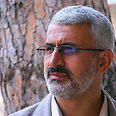
The London-based Arabic newspaper Asharq al-Awsat reported Friday that Hush Husam Nawis, also known as Hassan Shateri, a senior Revolutionary Guard official who was killed in Syria on Thursday, was in fact named Hassan Shateri, while Nawis served as his alias.
Shateri was a general in the Iranian Revolutionary Guard and headed the Iranian operation to rehabilitate the war-scarred country. He reportedly also served as Iranian President Mahmoud Ahmadinejad's personal emissary to Lebanon.
Related stories
- Rebels: Iranian official killed in airstrike on Syria
- Report: Iran building militias in Syria in case Assad falls
- US: 'We don't want weapons to fall into wrong hands'
The paper quoted a source involved in the issue, who claimed that Shateri, 58, was one of the leading commanders of the elite Quds Force within the Guard and commanded all of its and Teheran's overseas undercover activities.
Shateri's mission statement: "Exporting the Islamic Revolution."
In death, the paper claimed, he became the highest ranking to be killed outside of Iran.
He was sent to Lebanon after the Second Lebanon War, and his goal was to rehabilitate Hezbollah's operational infrastructure damaged during the conflict.
Under his guise as Hush Nawish he played the official role of Ahmadinejad's envoy to Lebanon, where he was charged with "rehabiliting southern Lebanon."
The paper further claimed that the American administration had recently added Shateri to their no-fly sanction blacklist of those who should personally suffer the sanctions aimed at government officials.
A man on a mission
According to the report, Shateri had a number of missions while in Lebanon. He reportedly received an impressive budget of up to $200 million annually; with it he was suppose to replenish Hezbollah's weapons stockpiles, reoperationalize the organization's rocket launchers and its ability to fire missiles, who were severely damaged during the 2006 conflict with Israel.
Interestingly, he was also charged with civilian projects, and according to the report one of his major focuses were residential housing projects.
In this regard it was reported that during the last eight years he has spent in Lebanon he had successfully erected a numerous residential buildings, currently housing some 600 Shiite families.
He was also reportedly charged with spreading around Iranian funds to political leaders, parliament members, journalists and other Lebanese public figures.
The most impressive of the paper's claims is that as part of role as the Revolutionary Guard's representative he was a senior partner in Hezbollah's central command, charged with charting the organization's course.
To Assad, with love
According to the paper, during the last two years he had become Teheran's man in Syria, charged with aiding the faltering regime.
The report specifically cited his involvement in raising elite units and fighters, as well as actively training these forces.
He additionally enlisted 400 Revolutionary Guard fighters to fight alongside Hezbollah men involved in the conflict.
Further, in regards to Syria, the report claimed that he was responsible for securing anchoring right for the Revolutionary Guard's navy at the Syrian port of Tartus, where, according to the report, Iran is developing military and civilian facilities.
Strengthening the paper's claim regarding Shateri's involvement in Syria were the comments made by Riad Hijab, the former Syrian prime minister who defected from Bashar Assad's regime.
Hijab spoke Friday to Alarabiya and claimed he believed Assad would not leave peacefully and further claimed that Iran is ruling Syria at the moment.
The circumstances of Shateri's death are still unclear.
According to Lebanese and Iranian reports, he was killed in an ambush placed by armed "terrorist" – the Syrian regime's code word for rebels – that awaited him on his return to Lebanon from Damascus.
However Asharq al-Awsat claimed that he was in Damascus for more than a week at the time of his death. During his time there he conferred with senior Syrian regime officials, hatching future plans.
The rebels, surprisingly, did not claim responsibility for his death. A spokesman for the Free Syrian Army said that no activities targeting specific persons were undertaken during the last 48-hours.
On the other hand, a spokesperson for the joint rebel command, Fa'ad al-Masri, claimed that the senior Iranian was killed as a part of Israeli's alleged attack two weeks ago because Shateri was charged with supervising missiles transfers from Syria to Lebanon.
- Receive Ynetnews updates
directly to your desktop















